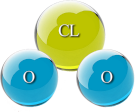How many Oxygen molecules are in a CDS protocol?
by Dr.h.c. Andreas Ludwig Kalcker
How many Oxygen molecules are in a CDS protocol C ?
go through the calculations step-by-step again to ensure accuracy.
1. Calculate the Mass of ClO₂ in 10 mL
Given that 3000 ppm means 3000 mg of ClO₂ in 1 L (1000 mL):
Mass of ClO₂ in 10 mL=3000 mg/1000 mL×10 mL=30 mg
2. Convert Mass to Grams
Convert 30 mg to grams:
30 mg=30/1000 g=0.030 g
3. Calculate Moles of ClO₂
The molar mass of ClO₂:
- Chlorine (Cl) = 35.453 g/mol
- Oxygen (O) = 16.00 g/mol
- Molar mass of ClO₂ = 35.453+2×16.00=67.453 g/mol
Now, calculate the moles of ClO₂: Moles of ClO₂=0.030 g /67.453 g/mol≈0.000444 mol
4. Determine the Number of Oxygen Molecules
Each molecule of ClO₂ contains two oxygen atoms, so:
Moles of O=2×0.000444 mol=0.000888 mol
Now, using Avogadro's number ($6.022 \times 10^{23} , \text{molecules/mol}$) to find the number of oxygen molecules:
Number of O molecules=0.000888 mol×6.022×1023 molecules/mol
this gives: ≈5.34×1020 molecules
5. Average Number of Red Blood Cells in the Body
Assuming an average human body has about red blood cells.
Oxygen molecules per red blood cell = 5.34×1020 molecules/ 5×1012 RBCs ≈5.34×1020 molecules
6. Calculate the Number of Oxygen Molecules per Red Blood Cell
Now divide the total number of oxygen molecules by the number of red blood cells:
Calculating this gives: =106.800 molecules/RBC
Author's note: I want to apologize for my initial calculations due to a comma mistake, which I stated at some conference.
